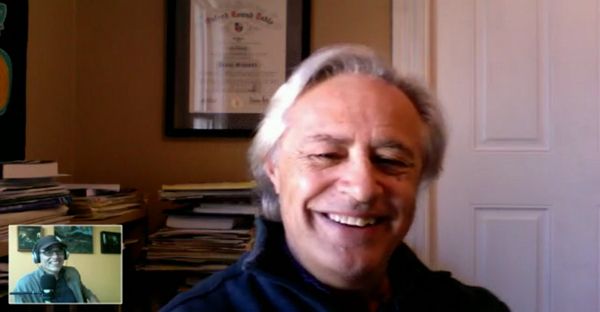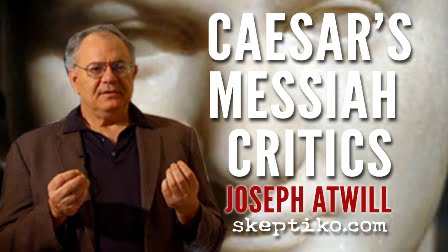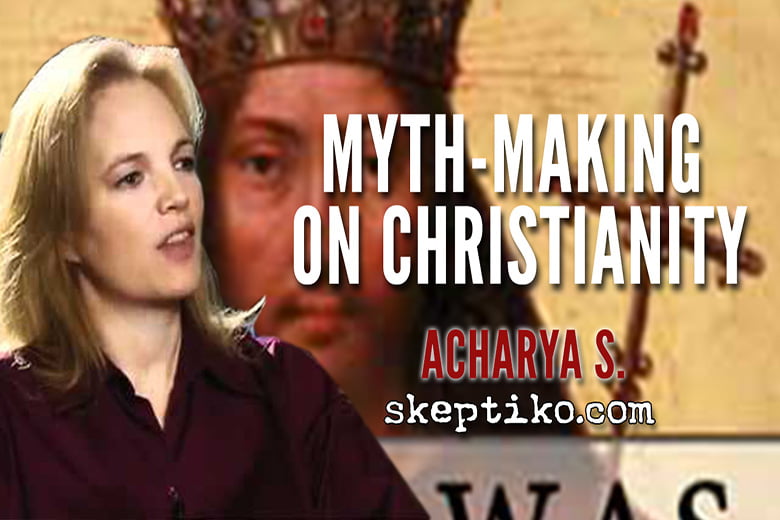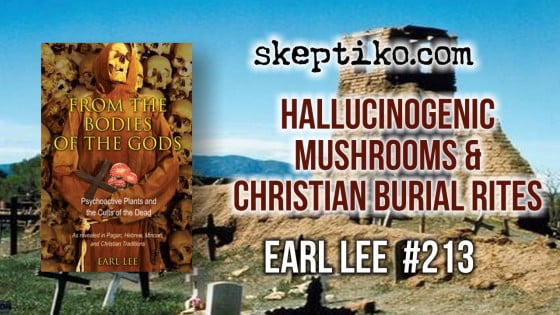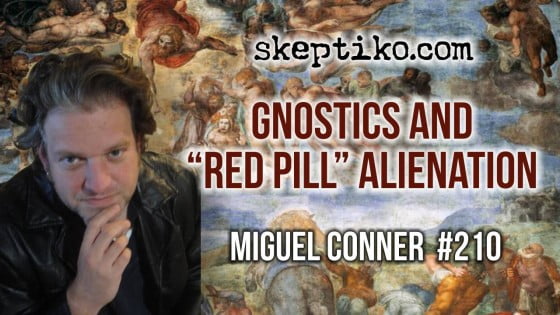Dr. Dana Sawyer's career studying religion and transcendence made him the perfect biographer of Huston Smith. photo by: Skeptiko Alex Tsakiris:...
Category: Spirituality
Suzanne Giesemann’s medium readings provide evidence of love and guidance |334|
Suzanne Giesemann traded a career in the Navy for a life as a psychic medium. photo by: Skeptiko Alex Tsakiris: Today we welcome...
Gordon White, Pieces of Eight: Part 2, Aleister Crowley, Opposite Day |333|
Gordon White wrestles looks at morality from a Magical perspective. photo by: Skeptiko Gordon White's new book Pieces of Eight: Chaos Magic...
Gordon White, Pieces of Eight: Part 1, Christianity’s Shadow |332|
Gordon White's new book challenges our understanding of Chaos Magic and religion. photo by: Skeptiko Gordon White's new book Pieces of Eight:...
She Brings Wicca to Psychotherapy With Tangible Results |329|
Dr. Jane Kent practices Wicca and High Magic in concert with traditional Western psychotherapy. photo by: Kali Bardi On this episode of Skeptiko,...
Jonathan Robinson, can technology help spiritual seekers? |320|
This psychologist believes technology can be used to assist spiritual seekers. photo by: Martin When Jonathan Robinson contacted me about doing an...
Can materialistic science answer life’s big questions? |317|
Science is notoriously bad at answering life's big questions, but can the methods of science bring us closer to truth? photo by: Marcello Maria...
Why are so many movies going Gnostic? |315|
Miguel Conner explains why movies like Snowpiercer and The Lego Movie rely on Gnostic themes. photo by: Bong Joon Ho Today we welcome Miguel...
Brad Warner teaches his Zen students ancient wisdom — Don’t be a jerk |311|
Zen teacher and author Brad Warner uses the ancient teachings of Dogen to reinforce a simple idea -- don't be a jerk. photo by: Michelle Grimord...
Why David Bentley Hart thinks choosing a tie reveals more about consciousness than near death experiences |298|
Theologian and Philosopher Dr. David Bentley Hart has little patience for sloppy thinking atheists. Looks to consciousness and spirituality. photo...
This Atheist has revolutionized Buddhism. Does consciousness science agree with his beliefs? |293|
Buddhist teacher Stephen Batchelor explores scientific materialism and secular Buddhism. photo by: Stephen Lasky I remember the first time I tried...
What divides Christians and non-believers |290|
Biblical Scholar Joel Watts looks at what Christians don't know about Christianity. photo by: Bolton We're conditioned to believe the cultural and...
Is the Bible a political con job? This scholar says the proof is right in front of us |289|
Biblical Scholar Joseph Atwill has forever changed how we understand early Christian history by focusing on religion as an instrument of political...
Shaman talk to plants. And the plants tell us how to heal|279|
When Western medical researchers wanted to unlock the healing properties of plants they asked Amazonian shaman. Simon Green is doing the same. ...
Is Christianity worth saving? |275|
Mark Vernon reveals how progressive Christians struggle with their tradition's past while holding on to the promise of spiritual transformation. ...
The internet is doing something no one expected — increasing spiritual enlightenment |266|
After 20 years as a meditation teacher Rick Archer turned to podcasting to bring 100s spiritual teachers to the public. You might meet your guru...
Are some Christian scholars changing their opinion of divinity? |263|
Alex Tsakiris of Skeptiko interviews Christian mystic Albert LaChance and religious scholar Rebecca Goodwin on experiencing spirituality, and the...
Controversial history of Jesus draws ire of Christians and atheists. Is Caesar’s Messiah legit? |241|
Interview with Joseph Atwill examines criticisms of his controversial theory about the founding of the Christian church and his book,...
234. Global Warming, Climate Change and Our Illusion of Control
Click here for YouTube version Click here for forum discussion Interview with the Rick Archer host of Buddha at the Gas Pump, and John...
226. Acharya S. Examines the Effects of Myth-Making on Christianity
Click here for YouTube version Click here for forum discussion Click here to post comments on AlexTsakiris.com Interview with religion and mythology scholar Acharya S. (D.M. Murdock) examines the effects of early Christianity on other religions of the time. Join Skeptiko host Alex Tsakiris for an interview with Acharya S. author of, Who Was Jesus? Fingerprints of The Christ. During the interview Acharya talks about the religion and myths: Alex Tsakiris: One of the things that your work is really important in doing, and it’s something we didn’t talk enough about, is that it’s a really thorough analysis of the power and practices of cultish behavior, of power formation, and power manipulation. I think unless we really come to grips with this we can’t separate out what happened to these religions. On one hand we have these traditions and these myths and those that made the myths, and on the other hand we have the same characters that we see on the landscape today that say, “Hey, wait a minute. Maybe I can make a buck off of this. Maybe I can control things. Maybe I can make my group superior and win out over the other groups. And maybe I can use these myths to do it.” Unless we thoroughly understand that stuff, and at the same time appreciate the possibility that there is some genuine non-biological-robot, spiritual experiences that may be happening; until all that’s on the table, we can’t really get our arms around it. Acharya Sanning: What I’m just doing is writing a factual recitation of what has happened in these places. It’s very empowering to know this stuff. Also, when we were talking in the beginning about being in the middle between extremists on either side, this mythicism position that I am discussing which looks at supernatural beings in antiquity as mythical figures, not real people who landed on planet Earth and did a bunch of magic tricks. This is really a neutral position because you don’t have to believe in it and you don’t have to dismiss it. You don’t have to be a theist or an Atheist. You can be either one to enjoy this information. All I’m doing is collecting religious and mythological ideas from as far back as we can tell and putting them together and showing their influences on our thinking today. It doesn’t require any kind of belief or any kind of joining or any kind of control... (continued below) Acharya's Website Play It Listen Now: Download MP3 (63 min.) Read It: Today we welcome Acharya S. to Skeptiko. Acharya, whose real name is D. M. Murdock, is a first-rate Biblical scholar and an expert in religious studies and mythology. She is also the author of numerous books including, The Christ Conspiracy, Who is Jesus?, and Sons of God. She also runs a website that is absolutely chock-full of high quality articles and research on the topics we’re going to talk about today. That website is at www.truthbeknown.com. Acharya, it’s great to have you on Skeptiko. Thanks so much for joining me. Acharya Sanning: It’s nice to be here, Alex. Thanks for inviting me. I also have a blog at www.freethoughtnation.com. In fact, I have another one, www.stellarhousepublishing.com. You can search across all my websites and a forum. People are invited to ask questions of me in the forum, as well.
...221. Atheist John Loftus Explains Why He’s a Biological Robot
Click here for YouTube version Click here for forum discussion Click here to post comments on AlexTsakiris.com Interview with atheist and Christian debunker John Loftus examines the philosophy of atheism. Alex Tsakiris: When we falsify this idea that you are a “biological robot”, and accept that’s absurd, and once we get past the idea that consciousness ends at death, which again, that’s where the evidence points, then a lot of things start falling differently in terms of how I orient myself to the world, how I orient myself to other people, how I orient myself to morals, purpose, meaning in life. You are not a biological robot, John. John Loftus: Okay. I disagree. I’ve said why. Alex Tsakiris: You say, “I am a biological robot. I am going to stand by that.” Right? That’s what you’re saying? John Loftus: Well, there’s no evidence for invisible beings, right? Entities. Alex Tsakiris: But you, as you live your life, you live your life like a biological robot? John Loftus: Everybody does. That’s all there is. Alex Tsakiris: Okay. John Loftus: Well, you have to look into the philosophical quandaries with trying to distinguish between mind and body. I mean, I taught the Introduction to Philosophy classes that you would probably be interested in looking at how they’ve tried to relate the mind and the body. They just really can’t do it. It’s really ludicrous to see how they do that. (interview transcript continued below) John Loftus - Debunking Christianity UPDATE: Follow-up Email Exchange (click here) Play It Listen Now: Download MP3 (64 min.) Read It: Welcome to Skeptiko, where we explore controversial science with leading researchers, thinkers, and their critics. I’m your host, Alex Tsakiris, and this episode of Skeptiko is yet another in this series I’ve been doing on Atheism. Now I do feel a need to tell you a little bit about how I came to do this interview because, as you know if you’ve listened, you just heard a similar kind of debate with philosophy professor Dr. Stephen Law. Actually, these two interviews with Dr. Law and John Loftus came about as the result of my interview on Episode 217 with Gary Marcus, because Gary Marcus is this NYU professor of psychology, bestselling author, writes frequently on consciousness issues, yet if you listen to the interview you’ll hear how he stumbled with some basic questions about consciousness.
...213. Earl Lee’s Shocking Theory Links Hallucinogenic Mushrooms to Christian Burial Rites
Interview explores theory suggesting that hallucinogenic substances were central to the development of religious thought and practices. Join Skeptiko host Alex Tsakiris for an interview with Earl Lee author of, From the Bodies of the Gods: Psychoactive Plants and the Cults of the Dead. During the interview Lee talks about his theory: Alex Tsakiris: In your book, you connect the use of hallucinogenic mushrooms by Shaman, depicted in these cave paintings, with some rather shocking ideas about how mushrooms might have been cultivated and used in early Christian. Take us through that. Earl Lee: My theory is that in ancient times there were people who were identified as a Shaman, either male or female, who was the person who would consume the mushrooms in order to prophesize the future, whether it was good crops or they needed to travel to some other place, and that sort of thing. Over time, as a Shaman used the mushrooms, the mushroom spores would get on their clothing and then later when that person dies and is buried, I think there’s a very strong likelihood, especially if they’re in a shallow grave, and a moist grave, for those mushrooms to actually grow, living off of the mixture of the natural fibers plus whatever viscous liquids might be wicked up from the decaying body. The reason I think this is probably what happened is because I think that at some point the bodies were accidentally unearthed and people saw these mushrooms growing on these bodies and decided that this person was particularly holy and that the mushrooms that come from a corpse are probably particularly valuable in terms of communicating with the gods or the next world or the afterlife. That linked in people’s minds that this is what we use to communicate with the dead. With the gods that listen to the dead. And how we have visions of the next world. You can see that idea reflected, particularly in Egyptian religion, but in other religions, too. (continued below) Earl Lee's Blog Click here for YouTube version Click here for forum discussion Play It Listen Now: Download MP3 (51 min.) Read It: Welcome to Skeptiko, where we explore controversial science with the leading researchers, thinkers, and their critics. I’m your host, Alex Tsakiris, and on this episode of Skeptiko I have an interview with a professor from Pittsburg State University where we explore his interesting theory that the origins of many of our religions, including Christianity, Judaism, and Islam, can be traced back to the use of hallucinogenic drugs. He even has some startling evidence about the cultivation of those mushrooms but we’ll leave that for the interview. What I want to do before the interview is to add a little context to this dialogue, particularly since Earl Lee is an Atheist, a rather outspoken Atheist, and as much as I appreciate his scholarship on this topic and the information that he’s brought forth which is really important for understanding these traditions that are so much a part of our culture—I don’t care if you live in Europe and you think you’ve shed yourself from all religious trappings and all the rest of that. Hey, these Abrahamic traditions are woven deep, deep, deep into our culture and there’s no escaping that. So this kind of work, that aims at seriously re-writing or rectifying that history, I think is important to all of us. At the same time, I’m amazed how academics in general and Atheists in particular can’t look deeper into the psychedelic experience and what it points to in terms of extended human consciousness. I mean, all the current research we have with hallucinogenics, Rick Strassman, David Nutt, all the rest, suggest that hallucinogenics are pointing us not towards the same old mind equals brain paradigm but to this idea of extended human consciousness. Now, to Earl’s credit, I think he’s willing to go there more than most people are but it still amazes me that more can’t see how this little twist in the story from “tripping early Christians” to “early Christians who are achieving transformative spiritual experiences through the aid of psychedelic drugs”, why that little twist in the road isn’t more obvious. This was a fascinating discussion for me. I really appreciate the scholarship of Earl Lee, whose work continues to fly under the radar despite its massive implications. I hope you enjoy this dialogue with Earl Lee from Pittsburgh State University: Alex Tsakiris: Today we welcome Earl Lee to Skeptiko as a faculty member and honorary professor at Pittsburgh State University. Now that’s in Kansas, folks, but it is called Pittsburgh State. Earl is the author of a fascinating book titled, From the Bodies of the Gods: Psychoactive Plants and the Cults of the Dead. Fascinating stuff. Earl, thanks so much for joining me and welcome to Skeptiko. Earl Lee: I’m glad to be here.
...210. Miguel Conner Explores Gnostic Themes and “Red Pill” Alienation
Interview with author and Podcast host examines Gnostic themes in our modern culture. Join Skeptiko host Alex Tsakiris for an interview with Miguel Conner author of, Voices of Gnosticism. During the interview Conner talks about the limits of Gnostic history: Alex Tsakiris: You do a masterful job exploring how these threads of Gnosticism are woven into our modern culture, but what about the limits of history? Isn’t Gnosticism limited in the same way Christianity’s limited in that it’s always looking in the rearview mirror for the next archaeological dig to tell us who we are? Isn’t that an inherent limitation of this kind of historical-based knowing? Miguel Conner: There certainly is, but it goes beyond history. I think the scholar, Ioan Couliano, who wrote, The Tree of Gnosis, said that there’s sort of a binary Gnostic code within man and this binary code will always go off. So, you’re always going to have Orthodoxy on one side believing that the world is going to be fine and that we’re part of this grand history, this providence. But there’s also the other side that’s always there. This side that tells us we are alienated; we are trapped in this world; there’s something wrong with this world. It’s invites us to go on this inner voyage inside and outside of us. That is why there are many writers and thinkers like Carl Jung and others who before the Nag Hammadi library was discovered were getting some of the Gnostic ideas and concepts. They were getting it very well even with the little information out there. So yes, we are limited by history but again I feel that this Orthodoxy and Gnosticism is within each one of us. That’s why it keeps resurfacing in so many different traditions, whether it’s Buddhist or Muslim and so forth. It’s there. Miguel's Aeon Btye Gnostic Radio Click here for YouTube version Click here for forum discussion Play It Listen Now: Download MP3 (48 min.) Read It: Today we welcome Miguel Conner. As host of Aeon Byte Gnostic Radio, author of the critically-acclaimed Voices of Gnosticism, Miguel is one of the leading voices of this Gnostic movement that we seem to keep hearing so much about. I should also mention that Miguel is also an accomplished fiction writer, having penned several popular post-apocalyptic vampire novels that have really caught the attention of people. So Miguel, it’s great to welcome you to Skeptiko. Miguel Conner: I’m glad to be here, Alex. Thank you for having me on. Alex Tsakiris: You know, I should mention we tried to do this a week ago but we ran into some Skype trouble so we’re going to do it again. In that intervening week I’ve dug into even more of your shows and I just keep wanting to dig more and more. You have such a great insight into this fascinating area of knowledge that is Gnosticism. You weave it into our modern culture and modern contemporary issues in such an imaginative, creative, and entertaining way that I just really wanted to get you on and encourage people to check out Aeon Byte Gnostic Radio. Miguel Conner: Thank you very much. I don’t know if I can live up to that billing, but I’ll try.
...209. Talat Jonathan Phillips Chronicles His Transformation From Political Activist to Spiritual Seeker
Interview with activist and author explores his personal journey with Ayawaska, ETs, and energy healing. Join Skeptiko host Alex Tsakiris for an interview with Talat Jonathan Phillips author of, The Electric Jesus: The Healing Journey of a Contemporary Gnostic. During the interview Phillips talks about finding a balance between the worldly and spiritual pursuits: Alex Tsakiris: If you buy into materialism, if you think you’re a biological robot and that’s all you are -- you’re lost. If you buy into our materialistic culture and this idea that we need to get all we can, and we need to bomb other people so they don’t get it -- all that stuff -- you’re lost. But as soon as you cross that chasm and you say, “Okay, there’s something more”, then I think you run into this problem what we’re talking about. And that is materialism keeps wanting to creep itself back into the equation. So, you’re saying, “I need to take action here. I need to go do this. I need to vote for this candidate. I need to do that.” Isn’t there the risk that we get into this back-door materialism, this “we’re in control” thing? Talat Phillips: Oh yeah. But I think it’s both. We’ve set up an either/or and I think it’s both/and because if I look at most of my clients, most of them come in and think we’re going to talk about past lives and this and that. But most of them need to get into the material world a little bit. They need to get in their bodies and figure out jobs and live an abundant life. That doesn’t mean buy a mansion but it just means to know how to support themselves and talk with people. I don’t want to deny that aspect because it is important. I denied it for many years of my existence and maybe that was why I was a marginalized activist. On the other hand, I definitely saw this with Occupy. It was very frustrating for me seeing all the projected anger about finances. I do a lot of anger work with clients. It’s good to express anger but when you project it at others it creates more of that fear culture. What I like with Evolver.net is that we’re more like, “How can you create? How can you follow your bliss and your passions and do what you love?” I think Joseph Campbell talks about this. This is a dance we have of integrating. So I think what you’ve brought up is a great study that we all do. It’s an alchemy of walking as a human and being as a human on this planet. It’s being and doing and creating a right relationship between that. Talat Jonathan Phillips Website Click here for YouTube version Click here for forum discussion Play It Listen Now: Download MP3 (47 min.) Read It: Today we welcome Talat Jonathan Phillips to Skeptiko. Talat is the author of The Electric Jesus: The Healing Journey of a Contemporary Gnostic. He is also the co-founder of a rather amazing web magazine named Reality Sandwich and an equally amazing social movement at www.evolver.net. Welcome to Skeptiko, Talat. Thanks so much for joining me. Talat Phillips: It’s great to be here. Thanks, Alex. Alex Tsakiris: Well, your book, The Electric Jesus, is just a great read. I mean, I was just blown away at how it pulls you in and just makes you want to turn page after page. It’s a spiritual odyssey, as the name suggests, but it reads like a Tom Wolfe novel. Tell us a little bit about this book and how it came about and what people are going to find when they read it.
...208. Dr. Julia Assante On Technology Training Us to Talk With Spirits
Interview with author, scholar, and psychic medium Dr. Julia Assante challenges our fear of death. Join Skeptiko host Alex Tsakiris for an interview with Dr. Julia Assante author of, The Last Frontier: Exploring the Afterlife and Transforming Our Fear of Death. During the interview Assante talks about the effects of technology on spirit communication: Alex Tsakiris: Let’s face it, we love this materialism we’re wrapped up into. We love our computers—we love our Internet, our Google, our Skype. So whether we wind up merging with the machine as Kurzweil predicts, it’s hard to deny this trajectory of technology. Dr. Julia Assante: I think we should really enjoy being in physical life. I think our technology is, in fact, the chief art of our era. And technology is also training us to think outside of the box, to think in terms of interdimensionality, and to think in terms of communicating with consciousness in other dimensions. If you think, for instance, of the telephone that was an astounding invention when it was presented in Philadelphia by Alexander Graham Bell. He used Hamlet’s soliloquy, talking to a skull of all things, to demonstrate the phone in public. People were nervous and frightened. They thought he was conjuring ghosts. So that kind of technology alone allows our paradigms to open and include discarnates, invisibles, crossing distances, all that kind of thing. The Internet is even doing more with the idea of cyberspace and collapsed space. I think that our use of electronics and digital systems are causing us to become more sensitive to subtler and subtler electrical impulses so I think technology is not at conflict with the so-called spiritual but is working with it as an analogy and as a training ground. Dr. Julia Assante's Website Click here for YouTube version Click here for forum discussion Play It Listen Now: Download MP3 (46 min.) Read It: Today we welcome Dr. Julia Assante to Skeptiko to discuss her new book, The Last Frontier: Exploring the Afterlife and Transforming Our Fear of Death. Dr. Assante is an Ivy League scholar in ancient Near East studies and--here’s where things get really interesting--a longtime practicing psychic medium who even while pursuing her Ph.D. at Columbia was talking to the dead. So Dr. Assante, welcome and thanks so much for joining me today on Skeptiko. Dr. Julia Assante: Oh, thank you for inviting me. It’s a great pleasure. Alex Tsakiris: Your book has received very high praise from the likes of Dr. Dean Radin, Dr. Larry Dossey, who also wrote the Introduction, and other notables. So first of all, congratulations on this fine book. Dr. Julia Assante: Well, I’m really honored to have these people, and even Deepak Chopra whose endorsements are very restricted. He’s only allowed to do seven a year so I’m very privileged.
...206. Rick Archer From Buddha at the Gas Pump on Meditation and Spiritual Practices
Interview with Rick Archer host of the website and Youtube channel, Buddha at the Gas Pump. Join Skeptiko host Alex Tsakiris for an interview with Rick Archer of, Buddha at the Gas Pump. During the interview Archer talks about a thought experiment he uses to better understand our place in the universe: Rick Archer: Here’s the game: zoom out to the level of perspective where you can watch the Andromeda galaxy collide with the Milky Way over the next 8 billion years. Realize, of course, that that’s actually a very, very tiny localized event compared to the whole universe but it’s big enough for our purposes here. Then imagine as you watch that over 8 billion years all the trillions and trillions of lives playing themselves out on all the inhabited planets in those galaxies. Each one of those lives seems very real and serious to the person living it, but from that perspective they’re like little fireflies winking in and out, even faster than that. Billions and trillions of little strobe lights going on and off. Now zoom it down, past the human level down to the level of the plank scale and you discover there is no universe. It’s just all a field of pure potentiality in which even a cubic centimeter of empty space at that level has more energy than all the energy in the entire manifest universe. That’s essentially what you are. Now zoom it back to the human level. Here’s what you are in expressed form, in a manifest, living form. But, this perspective as a human being is no more real than the zoomed out cosmic perspective or the zoomed in plank scale perspective. Those are just different perspectives on reality. We just have a peephole as a human being. Just a little peephole and yet we can actually culture an awareness that is cosmic like that. That does transcend time and space. That’s vast. That’s eternal. That can be our living reality. That can be the sort of substance of our lives. That’s what enlightenment is all about, which is the question you started this interview with. It’s not a pipedream; it’s not a fantasy. It’s something that many people have lived throughout history and something that we would have a very interesting world on our hands if it were commonplace. All the problems and travails that beset us as a civilization today would be just distant memories if that were a common experience. Buddha at the Gas Pump Website Click here for YouTube version Click here for forum discussion Play It Listen Now: Download MP3 (91 min.) Read It: Today we welcome Rick Archer to Skeptiko. Rick is the creator and host of Buddha at the Gas Pump, a website and YouTube channel that features an amazing collection of interviews with all sorts of interesting thinkers, spiritual teachers, and enlightenment-seeking individuals. Rick, I’m a big fan of your show and I’m so happy to welcome you to Skeptiko. Rick Archer: Well, the feeling is mutual. I started listening to your show for the first time last Tuesday and now it’s Saturday and I think I’ve listened to six or seven of them, which means over an hour a day I’m listening to Alex while I ride my bike and wash the dishes and stuff. I’m thrilled by it. I’m going to continue listening. You and Bill Maher and Bill Moyer are my favorite podcasters now.
...Conservative Christian filmmaker debunks ancient alien theories, but not Noah’s ark |199|
Interview with Ancient Aliens Debunked filmmaker Chris White who swamps the Ancient Alien theories with science, but relies on Biblical inerrancy for core beliefs. photo by David Hdez Join Skeptiko host Alex Tsakiris for an interview with Chris White, creator of the popular documentary film, Ancient Aliens Debunked. During the interview White discusses the film as well as his controversial conservative Christian beliefs: Alex Tsakiris: Here’s what Ancient Aliens, the TV show says is one of the most compelling bits of evidence for the Ancient Alien proposition, and that’s the site of Pumapunku and the ruins there. That’s where you start the film. So, take us through Pumapunku, and how that’s debunked. Chris White: The main thing that the Ancient Astronaut theory proponents suggest is that these angles are too perfect and the stone-cutting is too amazing to be anything that any ancient peoples could have done. We could talk about what the site actually was and so on but the main thing is that the stonemasonry there at Pumapunku is not difficult to do. There’s lots of things that they say are true about Pumapunku that are not. For example, they say that these stones are granite and diorite and therefore they’re too hard. Not only is that not true if they were granite or diorite but they’re not granite or diorite. They’re red sandstone and ambercite. They are not as heavy as they say they are and they’re not as in the right-angles as they say they are. Later, Mr. White offers opinions on the limitations of Islam and Buddhism, and the primacy of Christianity: Chris White: In Islam they have a lot of rules that say, “Give to the poor. Fast. Be nice to people.” Those are rules that they’re following because of threat of whatever. Alex Tsakiris: You can’t generalize like that, Chris. Chris White: I think it’s dangerous when we say, “Oh, we know that these people are just as good.” I think you can analyze—not their personality -- I’m not talking about whether they’re good or not but you can analyze the very tenants of what they’re trying to do. And I think very few times do people understand Hinduism or Buddhism or Islam or any of these things… Alex Tsakiris: Chris, how many Buddhist monks have you met? How many Buddhist monks have you encountered and really sat down and experienced, and talked to? Chris White: It’s really not about the individual; it’s about what they are claiming that any individual would claim… Alex Tsakiris: How is it not about the individual? It’s only about the individual. Chris White: Because nobody has reached the very thing that they need which is freedom from Nirvana or getting to Nirvana. Show me a Buddhist that would claim that right now. Everybody’s saying, “Oh well, the suffering is caused by tanha.” Tanha is sin. It’s our desires to do bad things that we don’t want to do. That’s the reason that any Buddhist is trying to do the ascetic practices. They try to eat less rice, go onto a hill, do whatever because they’re trying to defeat the innate desire to sin. Now, that’s their path. If you understand that they’re hoping that one day, if they do all the right meditations and they eat the less food and they give away enough possessions and they’re nice enough to people, it will happen and they will be diminished in their level of desiring to sin. That’s Buddhism. Ancient Aliens Debunked Website Click here for YouTube version Click here for forum discussion Read It: Today we welcome filmmaker, radio host, and podcaster, Chris White to Skeptiko. Chris’ latest documentary, Ancient Aliens Debunked, has caused quite a stir among Ancient Alien believers, as you might expect, as well as skeptics and even Evangelical Christians, as Chris himself is quite public about being a Conservative Christian. There’s a lot here to unpack and Chris, I’m really glad that you’re joining me today on Skeptiko to do just that. Welcome. Chris White: It’s great to be here, Alex. I’m really excited about this interview. It’s a really unique opportunity and I’m looking forward to it.
...181. Peter Bannister of the American Church in Paris Sees Hope For Science and Religion Dialog
Interview examines the shortsightedness of the culture war between science and religion. Join Skeptiko host Alex Tsakiris for an interview composer and lecture series co-director Peter Bannister. During the interview Bannister considers whether Christianity has lost it’s mystery: Alex Tsakiris: Modern Christianity is wed to materialism in some fundamental ways that make it hard to pull it out of there. So this is the problem I have with the dialogue with some of my Christian friends. It gets down to doctrine. I keep pushing saying, “This doesn’t make sense. You can’t really have this doctrine. You can’t really have this belief set as rigidly as that,” but their fallback is, “Well, come on, I am a Christian.” And I think there’s a direct parallel with the scientists. I think the scientists, whether they say it explicitly or not, is saying, “well, come on, I am a materialist because at the end of the day if I can’t measure it I’m out of business.” Peter Bannister: I think you’ve made some perceptive points, particularly about the marriage of convenience, or Faustian pact between Christianity and I would say Rationalism. But what’s curious if you do the history is that that’s a relatively recent phenomenon. I think that there is a very close tie to the rise of a certain type of science and a religious rationalism which insists that the doctrine really is about questions of proof and questions of discursive knowledge, propositions, dogma in the worst sense. There are a lot of historians who say that really is a very shortsighted view of what the broader tradition really is about which is much more mysterious and a little bit more fluid than that. But the people don’t actually know this tradition very well because nobody’s ever really told them. The truth that we’re after is much more relational than propositional. A lot of people in Christianity and some other wisdom traditions and faiths are saying, “Hang on. One of the big problems in the world today is that we’ve got hooked up with this notion of dogma. It’s dogma in the sense of an effort to control.” I think control is really the key thing because as soon as you have a doctrine which you say corresponds to reality in a sort of one-to-one way that gives you a method of control. Alex Tsakiris: That’s the bridge we have to cross. Science is a religion. Atheism is a religion. And now we’re all on the same playing field. Peter Bannister: Because it’s our ultimate concern. I think, a very good definition of religion. It’s what is your ultimate concern? If you go back to the idea of who do we want around this table, obviously the entry fee, as you say, is a certain ability to let go or to say, “Okay, we all bring ourselves to this but we bring ourselves to this in an open way.” My hope—and you might say I’m naïve in this—is that there is a groundswell of people who have this openness and who are genuinely interested in following and examining the data in an open and intelligent way. And I think there is a big need for the construction of a community like that. Peter Bannister's Website Play It: Download MP3 (48 min.) Read It: Alex Tsakiris: Today we welcome Peter Bannister to Skeptiko. Peter holds graduate degrees in music from King’s College, Cambridge, and philosophical theology from the University of Wales. He’s an award-winning composer and performer and is co-directing a very interesting lecture series at the American Church in Paris promoting an increased and enhanced dialogue in the relationship between science and faith. Welcome, Peter, thanks so much for joining me on Skeptiko. Peter Bannister: I’m delighted to be with you, Alex.
...169. Dr. Michael Heiser On Why Christians Are Skeptical of the Supernatural
Interview with biblical scholar Dr. Mike Heiser examines how many Christians approach paranormal claims from curiously skeptical perspective. Join Skeptiko host Alex Tsakiris for an interview with biblical scholar and author Dr. Michael Heiser. During the interview Heiser discusses his understanding of ghosts from a Christian perspective: Alex Tsakiris: What did you mean when you said, “Christians aren’t as open to the supernatural as they think they”, and that they, “think like skeptics.” What did you mean? Dr. Mike Heiser: …there are a lot of people who basically go through life thinking that unless their pastor or priest brought it up it’s either not true or it can’t be reported. I’ve had preachers and pastors tell me about doing a funeral service where they or somebody they known and trust saw the deceased person just sort of standing there for a moment. Well, you start saying things like that and right away our reaction is , “well, maybe you were overcome by grief… maybe you need a physical… maybe you didn’t take your meds that day.” We tend to think like moderns in that we are very hesitant to accept anything that’s outside the material reality. Alex Tsakiris: Okay, I’m right there with you, Mike. But what do we do with those encounters? What do we do with the deathbed visions, the near-death experiences, the ghostly encounters? How do we approach them? Dr. Mike Heiser: Well, I tend to think that these sorts of things are not either/or sorts of categories. I think there are a number of things that ought to be given equal weight. I believe in the supernatural. I don’t really like that term, but basically I believe in a non-human world. Since I do believe in that I’m not a philosophical Materialist. I’m willing to consider the possibility that the experience at a funeral was real. I’m willing to consider that this was really a point of intersection between our world and that other reality plane. Dr. Mike Heiser's Website Play It: Download MP3 (47 min.) Read It: Today we welcome Biblical scholar and author, Dr. Michael Heiser, to Skeptiko. Mike has a Ph.D. from the University of Wisconsin in Biblical languages and a master’s in ancient history from Penn. He’s a frequent guest on a number of radio programs such as Coast to Coast AM. He’s also the author of a paranormal thriller, The Façade. Mike, thanks so much for joining me today on Skeptiko. Dr. Mike Heiser: Thank you very much for inviting me.
...163. Physician Ian Rubenstein Encounters Spirit Communication, Becomes a Medium
Interview with London physician Dr. Ian Rubenstein reveals how one doctor's encounter with psychic phenomena led to Spiritualist Church mediumship. Join Skeptiko host Alex Tsakiris for an interview with Dr. Ian Rubenstein author of, CONSULTING SPIRIT: A Doctor's Experience with Practical Mediumship. During the interview Rubenstein discusses how he struggled to understand his psychic abilities: Alex Tsakiris: What you seem to be contrasting is a materialistic, medical paradigm that says there is none of this; this cannot happen. There is no way that the consciousness survives death. There is no way that spirits can influence us. That, I think, is what you’re really butting up against, and yet you seem to give that a lot more weight then I think it deserves in this case, especially given, (1) your personal experience and, (2) the research that you’ve done to see that there’s data to support it. Why do we have to stay with the materialistic paradigm? It doesn’t seem to work. Dr. Ian Rubenstein: I think you’re looking at a guy struggling with this. I don’t come from a religious background at all. I’m a non-practicing, left-wing, Jewish background. All my family was, you could say, very anti-religious. I’m not a religious guy. Spirituality is not new to me. I’m as affected by new-age stuff as much as everybody else, but it’s not native to my culture and background, and certainly not to my education. Western rationalist education is all pervading; it colors the way you see the world. It’s there, and I’m dealing with this every day. At medical school, you were taught how to think. You have to think critically. You do not trust your instinct. Every doctor knows that instinct is very important, and you get a feel for it, but you’re not trained in this. One of the things I develop in my book is that I found that training as a medium, having had all these experiences and then ending up sitting in a spiritualist circle, I actually found that you can train your intuition, that you can to some extent trust it, and it’s very useful. I now use it much more in my consultations. Of course, a skeptic would say, “You know, Ian, you’re an experienced doctor. You’ve been a family physician for 28 years. You’ve been a doctor for 34 years. Maybe this is just ordinary stuff.” I don’t know. Ian's book: Consulting Spirit Play It: Download MP3 (46:00 min.) Read It: Alex Tsakiris: Today we welcome Dr. Ian Rubenstein to Skeptiko. Dr. Rubenstein is a general practitioner in London who’s written a fascinating book titled, Consulting Spirit: A Doctor’s Experience with Practical Mediumship. Welcome to Skeptiko, Ian, and thanks for joining me. Dr. Ian Rubenstein: Thanks, Alex.
...





